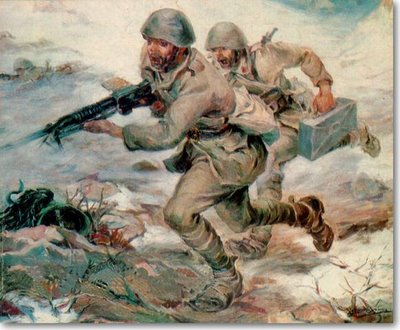By George Blytas, PhD
I would like to share with you some background concerning the 28th of October. This background goes beyond the military events that followed the Italian invasion of Greece at the Epirus-Macedonia /Albanian border and provides a deeper understanding of the reasons for which Mussolini selected that specific day to commit the gravest error of his life. I hope that this information adds an interesting new perspective to our understanding of the 28th of October.
Something that is hardly ever mentioned in connection with our celebration of the 28th of October, is the fact that until 1941, that particular day was a national day of celebration for Italy; but after that year, as we all know, it became one of the most important days in Greek history.
>>>>>>>>>>>>>>>>>>>>>>>>>>>>>>>>>>>>>
The history of the 28th of October for Italy starts much earlier than 1940; on that day in 1917, Italy's army was engaged in a fierce battle, the pivotal battle in the Austrian- Italian campaign, fought between the Austrians under Generals von Boijna and von Hotzendorf, and the Italians under- initially -Generals Cardona and Caviglia, and- eventually- Badoglio.That battle, the Battle of Caporetto, started on the 24th of October and lasted till the 12th of November 1917. We should keep in mind that at that time in WWI, Italy was fighting on the side of Britain, France, Serbia and pre-Bolshevik Russia against Germany, Austria, Bulgaria and Turkey.
In the Battle of Caporetto, the 28th of October, particularly, was a most disastrous day for the Italians. Although the exact number of fatalities is not known, most military historians believe that in that battle–overall– each side suffered about 400,000 casualties (dead and wounded) excluding the prisoners taken. From that year on, the 28th of October was etched in the Italian psyche as a day of ignominy.
The years that followed WWI, saw Italy descend into an abyss of anarchy and instability both social and economic, much of it masterminded by a rubble-rousing journalist called Benito Mussolini. On March 23, 1919, Mussolini founded the Italian Fascist Party and formed its first black-shirted brigades. Despite their odious characteristics, the ineffectual king of Italy Vittorio Emmanuel II, preferred the fascists and the black-shirts to the alternative emerging political force, the communists, who were trying to emulate their Russian anti-royalist comrades. So, when on October 28 King Emmanuel sent Mussolini –who at that time was still "working" as a journalist in Milan– a telegram asking him to take over the dysfunctional Italian government, that date was etched in Mussolini's psyche in golden letters. He immediately organized his infamous March to Rome, with all the theatricality he could muster, sending his black-shirts to occupy government buildings in Rome and other big cities. Furthermore, in order to also expunge the ignominy of the battle of Caporetto, he designated October 28 a national day of celebration for Italy. And it was thus celebrated until 1940.
Fast-forwarding to the years before WWII, it is well known that the Duce had grandiose ideas about Italy's control of the Mediterranean, which he called mare nostrum, ""our sea"" , and he had definite ideas about the formation of a new Roman Empire on the footprint of the old one, with Greece being one of the colonies, alongside Libya, Abyssinia, Somalia and other territories. So it was a matter of time before Duce would invade Greece. After Italy's entry into WWII, Mussolini chose to invade Greece on the 28th of October 1940, his date of fate, in part ignoring Hitler's strong admonition not to do so until certain strategic points in the Mediterranean (including Crete) were secured. In the meantime, on October 22 and 23 Hitler held meetings at the French-Spanish border with Franco and Petain, trying to convince them to join him and Mussolini in a "grande alliance" against Britain. The meetings were held in Hitler's personal train called Amerika(!).
On his way back from the Spanish/French border to Austria, Hitler learned about Mussolini's intention to invade Greece, and was infuriated. However, his information was incomplete, he had no definite date, and he asked to see Mussolini immediately, hoping he could dissuade him. But the earliest Mussolini "was available was… the 28th of October at the Florence train station". Obviously the Duce did not wish to be held back by the Fuehrer.
At 10 AM on the 28th of October, Mussolini received Hitler with a broad smile and saying:
……….Fuehrer we are marching!
Hitler was furious, but he kept calm. However, he never forgave Mussolini that grave error. In many of his letters to the Duce, and in his last testament signed in the bunker under the Chancellery in Berlin on February 17, 1945, a few days before his suicide, Hitler attributes the Axis defeat on Mussolini's aggression to Greece and the following avalanche of Italian defeats in the mountains of Epirus, South and North. Hitler goes beyond simply attributing the Axis loss to Mussolini's initiative, he gives his reasons (1).
On October 28, 1940, when the bersaglierri came across the Albanian border into Epirus in the Kakavia and Mertziani Passes, they were actually….marching with their bugles and side-drums up front (!). They were not received with flowers, however. Instead, the artillery of Major General Katsimitros' VIII Ioannina Division, sent them scampering about, vainly looking for cover.
And the rest is HISTORY.









